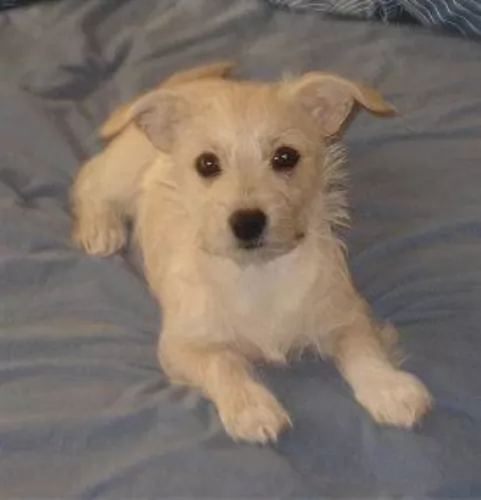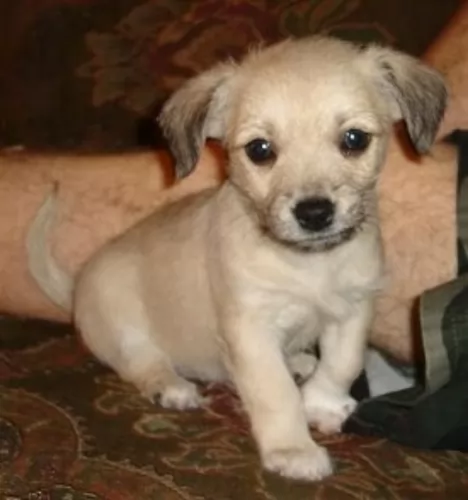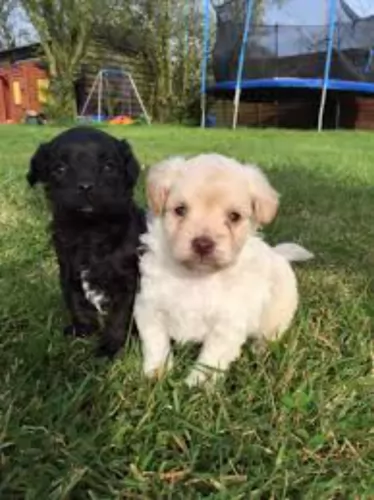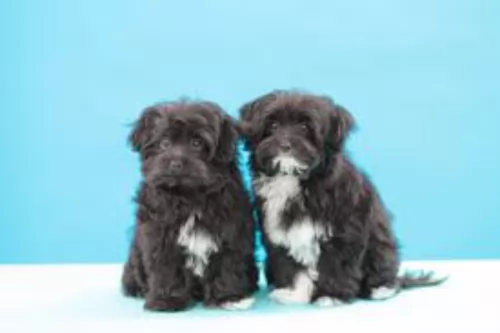 Petzlover
Petzlover Chipoo is originated from United States but Saarlooswolfhond is originated from Netherlands. Chipoo may grow 37 cm / 14 inches shorter than Saarlooswolfhond. Chipoo may weigh 36 kg / 79 pounds lesser than Saarlooswolfhond. Chipoo may live 3 years more than Saarlooswolfhond. Both Chipoo and Saarlooswolfhond has almost same litter size. Both Chipoo and Saarlooswolfhond requires Low Maintenance.
Chipoo is originated from United States but Saarlooswolfhond is originated from Netherlands. Chipoo may grow 37 cm / 14 inches shorter than Saarlooswolfhond. Chipoo may weigh 36 kg / 79 pounds lesser than Saarlooswolfhond. Chipoo may live 3 years more than Saarlooswolfhond. Both Chipoo and Saarlooswolfhond has almost same litter size. Both Chipoo and Saarlooswolfhond requires Low Maintenance.
 The Chipoo is not a purebred dog but rather a cross between the Toy Poodle and the Chihuahua. In the 1970’s the two breeds were crossed and the Chipoo was born. Chihuahuas have their origin in Mexico while the poodle is believed to come from Germany. This hybrid dog, because he comes form two purebred dogs is considered to be a designer dog. The Chipoo is not of course a purebred dog and is not recognized by the American kennel Club (AKC), but it is recognized by the designer groups and hybrid groups. These organizations include the International Designer Canine Registry, the American Canine Hybrid Club, the Designer Breed Registry, and the Designer Dogs Kennel Club.
The Chipoo is not a purebred dog but rather a cross between the Toy Poodle and the Chihuahua. In the 1970’s the two breeds were crossed and the Chipoo was born. Chihuahuas have their origin in Mexico while the poodle is believed to come from Germany. This hybrid dog, because he comes form two purebred dogs is considered to be a designer dog. The Chipoo is not of course a purebred dog and is not recognized by the American kennel Club (AKC), but it is recognized by the designer groups and hybrid groups. These organizations include the International Designer Canine Registry, the American Canine Hybrid Club, the Designer Breed Registry, and the Designer Dogs Kennel Club.
 Dutch breeder Leendert Saarloos began to breed German Shepherds to a European wolf. His goal was to bring out a dog that was more hard working.
Dutch breeder Leendert Saarloos began to breed German Shepherds to a European wolf. His goal was to bring out a dog that was more hard working.
The Dutch Kennel Club recognized this dog breed in 1975, and to give honor to the breeder, they gave the name to the dog - Saarloos Wolfdog. The dog was also recognized by the Federation Cynologique Internationale.
Today the Saarloos is regarded as a pet and companion. It was in 2015 that a study found that this dog showed more genetic association with the gray wolf.
 The Chipoo varies greatly in looks depending upon which breed it got most of its characteristics from. It is a toy dog, but it can have a curly coat or a straight one. It can be fluffy or wiry. It can be just about any color. All of them have Chihuahua tails but again depending on the mix, they can look like poodles or they can look like chihuahuas. They can vary in size from a very small toy to a larger sized small dog. You can have two Chipoos from the same litter and they will not be recognizable as littermates. However, they will all be adorable.
The Chipoo varies greatly in looks depending upon which breed it got most of its characteristics from. It is a toy dog, but it can have a curly coat or a straight one. It can be fluffy or wiry. It can be just about any color. All of them have Chihuahua tails but again depending on the mix, they can look like poodles or they can look like chihuahuas. They can vary in size from a very small toy to a larger sized small dog. You can have two Chipoos from the same litter and they will not be recognizable as littermates. However, they will all be adorable.
 The Saarloos Wolfdog is a large dog standing at between 60–75cm male and female and weighing between 30 and 45kg. He is athletic and muscular with a short, dense coat. Colors are wolf-grey, white and red. The Saarloos has wolf-like expressions so the ears are erect, the muzzle pointed and the tail long and plumed. They eyes are a yellow color. The face is bright and alert, showing how intelligent he is.
The Saarloos Wolfdog is a large dog standing at between 60–75cm male and female and weighing between 30 and 45kg. He is athletic and muscular with a short, dense coat. Colors are wolf-grey, white and red. The Saarloos has wolf-like expressions so the ears are erect, the muzzle pointed and the tail long and plumed. They eyes are a yellow color. The face is bright and alert, showing how intelligent he is.
The Saarloos Wolfhound is full of energy so will be looking toward his owner to come up with good exercise for him.
A walk will always be welcome, but for such a lively dog, he’ll want something more energetic such as a hike, swimming, being allowed to run off his leash in the park and lots of vigorous ball- and rope games.
He is an independent dog and for this reason you’ll want him trained and socialized to make him obedient. He is loyal and loving but some of his wolf-like characteristics might mean that he isn’t a good choice for the first-time dog owner. If the first time dog owner is firm, consistent, strong and kind, then everything will be alright.
 The Saarloos Wolfhound is a beautiful wolf-like dog that is full of life and energy. When you bring him into your life, you’re going to to have a wonderful addition to your family.
The Saarloos Wolfhound is a beautiful wolf-like dog that is full of life and energy. When you bring him into your life, you’re going to to have a wonderful addition to your family.
He is an independent dog that is strong-willed so it pays to have him trained and socialized, and then he becomes a balanced, well mannered dog that is loving and loyal with his beloved human family.
 Hybrid dogs often do better health wise than the original parents, but this is not true of 2nd and third generation crosses. However, this is not generally true of the Chipoo, as they are no longer bred poodle to chihuahua but rather Chipoo to Chipoo. They are basically healthy but face some issues such as:
Hybrid dogs often do better health wise than the original parents, but this is not true of 2nd and third generation crosses. However, this is not generally true of the Chipoo, as they are no longer bred poodle to chihuahua but rather Chipoo to Chipoo. They are basically healthy but face some issues such as:
This is what causes the tear stains on most small light-colored dogs. This is called Epiphora and is not an irritation in the eye, just overly active glands.
This is low blood sugar and can cause all kinds of problems for your Chipoo. This can be fatal if not cared for. It has many causes if the dog is not diabetic including Xylitol (sugar free gum and other) parasites, stress, diarrhea or bacteria.
This loose knee cap condition is found in many small breeds and can lead to arthritis and lameness.
 A well bred Saarloos Wolfhound is regarded as very healthy, and with good care they can reach up to 12, 13, 14 or 15 years of age.
A well bred Saarloos Wolfhound is regarded as very healthy, and with good care they can reach up to 12, 13, 14 or 15 years of age.
This is a common canine disease which comes about when a dog’s hip joints don’t develop properly. For a dog diagnosed with hip dyslasia it can be painful lying down and getting around.
Hip dysplasia is a genetic condition, but diet also plays a part as well as environmental factors. All dogs breeds are susceptible to hip dysplasia. Try and avoid your dog putting on too much weight as then it puts excessive strain on the joints. There are different treatment options to make it more comfortable for your pet.
 Because they are prone to hypoglycemia, make sure you feed a high quality dry food and break it up into three or four small meals a day in order to maintain the blood sugar and avoid the drops and spikes that can cause them serious health issues.
Because they are prone to hypoglycemia, make sure you feed a high quality dry food and break it up into three or four small meals a day in order to maintain the blood sugar and avoid the drops and spikes that can cause them serious health issues.
This is common in the Chipoo and it makes it hard for the dog to absorb things through the skin such as topical ointments for ticks and flea prevention.
If the outside temperature is less than 50’, then your Chipoo needs to wear a sweater as they get cold very easily.
The Chipoo is an energetic little dog and he loves to go on walks, play in the yard and be with the family. Both the Chihuahua and the Poodle are very intelligent dogs and so this cross gets bored and destructive if not stimulated enough. He’ll be great at agility and obedience. Like the poodle you can teach him a lot of tricks.
 He’s an active dog so he will need a good dose of exercise to keep that muscular, lean look.
He’s an active dog so he will need a good dose of exercise to keep that muscular, lean look.
You will need to brush the dense double coat twice a week to ensure the removal of loose hairs and to keep the coat shiny and glossy. Trim his nails and check inside his mouth as he can’t tell you when he has a rotten tooth which can cause a lot of pain.
Feed puppies 4x a day.
Puppies 6 months on can have 2 meals a day.
Always feed your dog premium-quality dry food. Twice a week you can add home-made food to the dry kibble as a tasty treat. Add boiled chicken, brown rice or pasta and spinach, sweet potatoes and carrots. This food can all be chopped up and a portion added to the kibble. The rest can be frozen and then a portion warmed up for another meal.
Try and add some raw meat to his food occasionally as this helps to keep skin problems at bay.
Ensure there is always a bowl of fresh, cool water within his reach.
Your pet needs a warm, dry, comfortable place to sleep to call his own.
If your dog spends a lot of time outdoors, make sure there is both shade and sun.
Spaying and Neutering – beneficial if you don’t want puppies.
Vaccinations for puppies and adults to stave off deadly canine diseases.